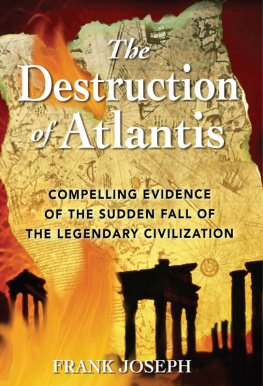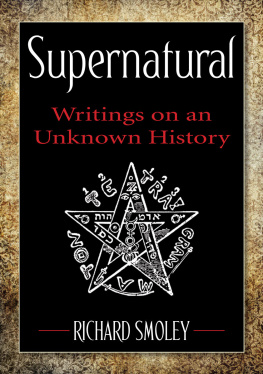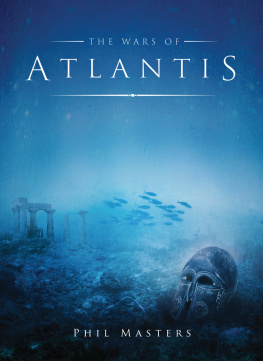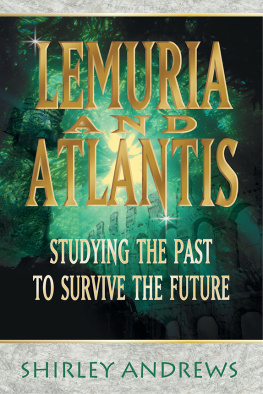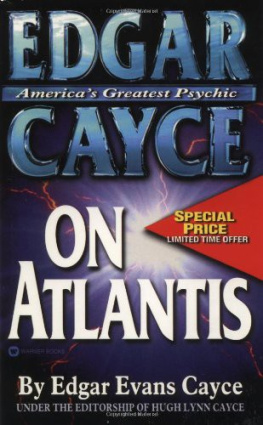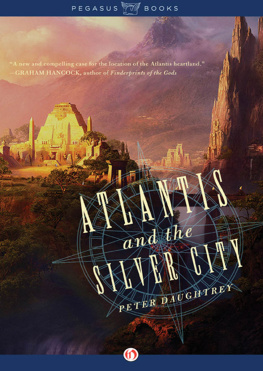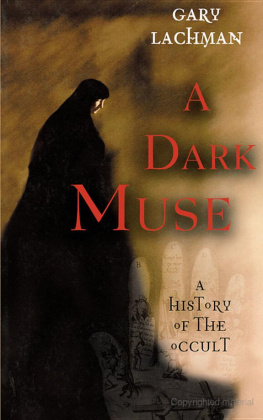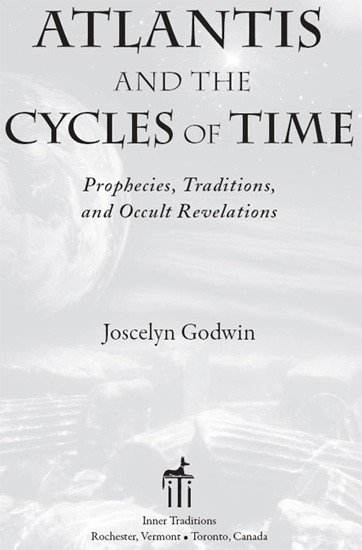
ATLANTIS AND THE CYCLES OF TIME
In this important book Joscelyn Godwin has accomplished the nearly impossible, masterfully summarizing and synthesizing widely disparate approaches to the perennial question of Atlantis. Much more than a catalog of possible Atlantis locations, occult Atlantology is finally accorded the importance it deserves, including a cogent analysis of esoteric cycles of time, the Four World Ages, the Yuga Cycle, and the Precession of the Equinoxes, placing Atlantis in a larger temporal context. This is a must-read for anyone who wishes to truly understand the Atlantis debate.
ROBERT M. SCHOCH, PH.D., AUTHOR OF VOYAGES OF THE PYRAMID BUILDERS AND THE PARAPSYCHOLOGY REVOLUTION
From the sublime to the ludicrous, from the poetic to the simply mad, Joscelyn Godwin gives us a chart of the many versions of Atlantis (with all their glaring lack of consensus) that will last us till the lost continent rises again. Truly Godwin is the Master of Atlantis.
PETER LAMBORN WILSON, COAUTHOR OF ATLANTIS MANIFESTO AND GREEN HERMETICISM: ALCHEMY & ECOLOGY
Preface and Acknowledgments

Most writers on Atlantis begin with the discouraging news that there are already thousands of books on the subject. Why write another one? Why read one? It is because of an idea, a dream, a theory that will not let go:
That there was high culture in prehistoric times.
This is the core of the Atlantis myth, ever since the Egyptian priest told the story recorded by Plato. The sciences of time prefer to close the curtains on it. They assure us that such things as cities, technology, a leisured class, organized religion, and warfare only arrived within the historic period. The lines of development and influence, they say, are well mapped. Beyond a certain time barrier, there was no high culture anywhere on Earth: only the primitive culture, however ingenious and admirable, of Stone Age peoples and nomads.
The least interesting books on Atlantis are the ones that toe this line, proclaiming that Platos Atlantis was really somewhere quite normal and recent, like the volcanic island of Santorini that erupted in the second millennium BCE. The first chapter of this book is a worldwide survey of such theories.
Other authors, more bold, cling to the myth and reject the scientists time barrier. They are suspicious of experts who preserve the status quo by dampening speculation. Just as historical civilizations and empires rise and fall, they ask, why should not the broader waves of human development? Even if our own civilizing wave began with the city cultures of Jericho or the Indus Valley, that does not mean it was the first and only one. There has been plenty of time for other waves, other cultures, even other humanities to come and go.
The New Archaeology that holds, for instance, that there was high civilization in pre-dynastic Egypt or the Andes, tries to argue this on rational grounds. It draws on archaeological evidence and aligns it with ancient texts and myths. But the writers of those texts had a worldview as different as possible from scientific materialism. To credit them starts one on a slippery slope that may lead to actually believing them. Then, as some of the New Archaeologists have found, one enters the company of the Damned.
I borrow that word from Charles Fort, author of The Book of the Damned (1919) and other chronicles of anomalous phenomena. So by the damned, wrote Fort, I mean the excluded. In the present case, this would be all those Atlantologists whose view of human prehistory rests on something other than rational deduction and material evidence. It is wrong to call them irrational, for they do not reject those avenues of knowledge: they just find others supplementary, if not superior. The Traditionalists rely on an esoteric reading of scriptures and sacred authorities. Theosophists and others open to the paranormal call on intuition, initiation, clairvoyance, or mediumship. There is much disagreement among them, just as there is among the rationalists, but they agree that there was high culture in prehistoric times and that it holds a lesson that we do well to learn. Chapters 210 trace their various strands and influences, with special attention to the national schools and their agendas. No matter how much or little one credits them, they open up vastnesses that are exhilarating to contemplate.
None of the myriad books on Atlantis has dealt comprehensively with this branch of the history of ideas, which we may call occult Atlantology. Nor has there been a proper study of another topic profoundly linked to it: that of the cycles of time, one phase of which supposedly ended with the Atlantean cataclysm. Both subjects are the preserve of true believers wedded to their own theories, and of careless repeaters of second-hand data.
The subject of esoteric time cycles deserves a book to itself, but it would be one with limited appeal, full of tables and calculations. Chapters 1112 are a preliminary decluttering of the field. They explain the two main cyclical systems, the Four World Ages and the Precession of the Equinoxes. I have made this summary with a certain sense of urgency, because at the time of writing there is much agitation concerning the coming year 2012. The reader will discover that the present period, even the fateful year, has figured quite prominently in cyclical theories that have nothing to do with the Mayan calendar. It seems important to set out the bases of these and other theories, and also to clarify the controversy about which of the four ages we are living in. My hope and expectation is that long after 2012, others will follow up some of these leads in the same spirit of open-minded curiosity.
Unless otherwise attributed, all translations are mine.
ACKNOWLEDGMENTS
First I must thank Colgate University, especially those in charge of the Scientific Perspectives Core Courses, for their support of The Atlantis Debate, and the hundreds of students who have passed through this course in ten years. If any of them should read this, I greet them as fellow explorers. Colgates president and dean of the faculty generously granted me leave in fall 2009. I thank the staff of Colgates Case Library, especially its Interlibrary Loan Service; also those at Cornell University Library, the British Library, the Cambridge University Library, the Bibliotheca Philosophica Hermetica (Amsterdam), the National Library of Malta (Valletta), and the libraries of the University of Strasbourg and the Theosophical Society (London), to which I paid short but fruitful visits. I thank Phyllis Benjamin of the International Fortean Organization and Walter Cruttenden of the Conferences on Precession and Ancient Knowledge for giving me a forum for some of these ideas. A friend from Portugal supplied me with recondite material and insights into the Traditionalist current. My colleague Anthony Aveni has encouraged me for many years through conversation and his own teaching and research. Others who have given me materials or ideas on these topics include Frank Donnola, Antoine Faivre, Deborah Belle Forman, Patrick Harpur, John Major Jenkins, Gary Lachman, Jean-Pierre Laurant, Ernest McClain, the late John Michell, James Santucci, Guido Mina di Sospiro, Rdiger Snner, Jay Weidner, Peter Lambourn Wilson, and the guest lecturers in my course: Paul LaViolette, Robert Schoch, Laird Scranton, and John Anthony West. None of them are responsible for my omissions, errors, or opinions. Lastly I thank my wife, Janet, especially for her piano-playing that accompanied the writing of this book.
Next page


